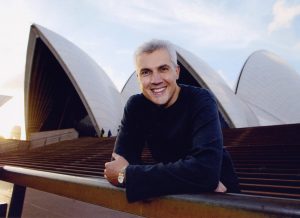
Andrew Schultz’s acclaimed music covers a broad range of chamber, orchestral and vocal works, and has been performed and broadcast widely by many leading groups and musicians internationally. He has held prizes, awards and commissions including from all the major Australian orchestras. Andrew has written a number of large-scale works, including three operas (Black River, Going Into Shadows and The Children’s Bach), which have been presented live and on film around the world. Other major works include Journey to Horseshoe Bend, Song of Songs and three symphonies. Recent orchestral works include Sound Lur and Serpent for the Sydney Symphony, Peace and Endling for the Tasmanian Symphony, Maali and Bassoon Concerto for WASO and August Offensive for the centenary of Gallipoli.
Andrew has held residencies and academic posts in Australia, Canada, Czechia, France, Germany, USA, and the UK. He is Emeritus Professor of Music at UNSW, Sydney and currently a Visiting Professor at Harvard University. Recent composition successes include the Paul Lowin Prize, Schueler Award, Art Music Awards, Australia Council Fellowship, Cité des Arts Paris residency and the Centenary of Canberra commission.
Recordings of his orchestral music performed by the Sydney, Queensland, West Australian, Adelaide and Tasmanian Symphonies are available on ABC Classic, Moravian Philharmonic has released his Falling Man/Dancing Man and Symphony No 2 – Ghosts of Reason for Navona, three volumes of chamber music are available on Tall Poppies label, Brisbane Chamber Choir and Kühn Choir of Prague have each released his Magnificat and Nunc dimittis, a disc of ensemble vocal music has been released by The Song Company, and Wirripang have released a solo piano CD played by Antony Gray, a chamber music album played by Southern Cross Soloists, and the opera, The Children’s Bach.
| Title | Description | Composer | Voicing | |||
|---|---|---|---|---|---|---|
 |
As Wave Drives Wave |
AS WAVE DRIVES WAVE for choir, opus 115 (2021) by Andrew Schultz is an unaccompanied setting of memorable lines from Ovid’s Metamorphoses which he in turn drew from Pythagoras’ The Eternal Flux. The motion of the waves and their restless renewal is used as a metaphor for the certainty of perpetual change in the universe. The imagery in Ovid’s text is very beautiful and possibly even a little melancholy – or maybe granitic and philosophical and hence, sadness is irrelevant. In this choral setting the text has been adapted and personalised by the composer. This six minute piece is based on slow-moving harmony with sequences of overlapping and interlocking chords – as if unresolved suspensions were waves pushing waves. The work is an eight-part SATB choir setting but a lot of the work is really in four parts with pairs of voices starting in unison and then splitting apart. As wave drives wave was commissioned by the Brisbane Chamber Choir and their Artistic Director, Graeme Morton, and was composed in late 2021. They perform the work here at Christ Church North Adelaide, South Australia as a part of the Adelaide Chamber Singers Festival in October 2023. The video was recorded by Australian Digital Concert Hall. TEXT Since I have embarked on endless sea and set my sails, I now do know this: As wave drives wave, And each, pursued, Pursues the next. For what was before is left behind; And what was not, now is; And each moment is new. So time, flies on and follows, Always, forever new, And is always new. For neither the river Nor this tide can Can stop their flow. I say: There is nothing In the whole universe, Nothing that persists. For that which once was is now gone. Text is adapted by the composer from Ovid, Metamorphoses, Bk XV:176-198, “Pythagoras’s Teachings: The Eternal Flux.” Recording from the Brisbane Chamber Choir at the Adelaide Chamber Choir Festival, October 2023, via The Australian Digital Concert Hall.
|
||||
 |
Magnificat (Opus 79) |
New to Morton Music – digital copies are now available from RSCM Music Direct (UK) via the Other Countries link. Magnificat (Opus 79) was composed over the summer of 2008-2009. The work is an a cappella setting of the Latin Vulgate text and was written in response to a commission from the Sydney Chamber Choir. Marked ‘Calm and gentle – with flow’ the score carries an inscription from Emily Bronte’s poem of creativity, Last Lines, “No coward soul is mine.” The first performance of Magnificat, was given by the Sydney Chamber Choir conducted by Graham Abbott at the City Recital Hall, Angel Place, Sydney, 6 September 2009. Duration: approximately 8 minutes
Nunc Dimittis (Opus 89) is sold separately and was written in 2011 in response to a commission from the Brisbane Chamber Choir who had already performed Andrew Schultz’s Magnificat and wanted to have Nunc Dimittis to perform with the earlier work. The setting of the text parallels the dramatic flow of the original text, The Song of Simeon. The work moves from a world of clouded uncertainty through exultation and revelation to a final passage of transcendent simplicity and tranquillity. Marked ‘Flowing’ the Nunc Dimittis is similar to Magnificat in the tempo and meter (3/2) and in the ebb and flow between four and eight part vocal writing. |
||||
 |
Mind |
The recording above features the St Peter’s Chorale, directed by Kathryn Morton. |
||||
 |
Nunc Dimittis (Opus 89) |
New to Morton Music – digital copies are now available from RSCM Music Direct (UK) via the Other Countries link. Nunc Dimittis (Opus 89) was written in 2011 in response to a commission from the Brisbane Chamber Choir who had already performed Andrew Schultz’s Magnificat and wanted to have Nunc Dimittis to perform with the earlier work. The setting of the text parallels the dramatic flow of the original text, The Song of Simeon. The work moves from a world of clouded uncertainty through exultation and revelation to a final passage of transcendent simplicity and tranquillity. Marked ‘Flowing’ the Nunc Dimittis is similar to Magnificat in the tempo and meter (3/2) and in the ebb and flow between four and eight part vocal writing. The first performance of Nunc Dimittis was given by the Brisbane Chamber Choir conducted by Graeme Morton at St John’s Cathedral, Brisbane, in August 2012. Duration: approximately 5 minutes Magnificat (Opus 79) sold separately was composed over the summer of 2008-2009. The work is an a cappella setting of the Latin Vulgate text and was written in response to a commission from the Sydney Chamber Choir. Marked ‘Calm and gentle – with flow’ the score carries an inscription from Emily Bronte’s poem of creativity, Last Lines, “No coward soul is mine.” |